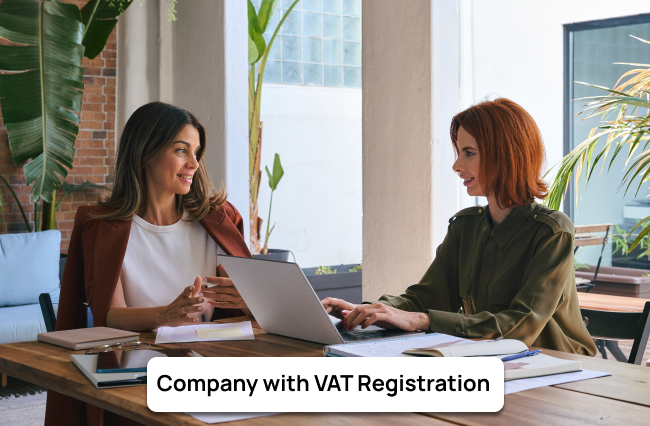Starting a business involves navigating a maze of regulatory, financial, and operational hurdles, one of which is Value Added Tax (VAT) registration. For entrepreneurs entering industries such as e-commerce, import/export, or consultancy, being VAT-registered from the outset is not only beneficial—it’s often essential. However, applying for VAT registration after setting up a new company can take weeks or even months, which can delay revenue-generating activities and essential partnerships.
To overcome this bottleneck, many entrepreneurs consider an alternative route, buying a company with VAT registration already in place. These companies, sometimes known as VAT-ready or VAT-registered shelf companies, offer the advantage of immediate compliance and operational readiness. But is this strategy right for everyone? This article unpacks everything you need to know about purchasing a VAT-registered company. From understanding what VAT means in practice to evaluating the legal implications, risks, and rewards, we’ll help you make an informed decision.
You will also learn how to identify a credible provider, what documents to verify, and how jurisdictions differ in their VAT policies. By the end, you will understand whether acquiring a company with a VAT number is the fast-track solution your business needs, or if forming a new company and applying for VAT the traditional way is a better fit.
What Is a VAT-Registered Company?
A VAT-registered company is a legal entity that has been officially registered with the relevant tax authority to collect Value Added Tax (VAT) on goods or services. This is often mandatory when a business reaches a certain turnover threshold.
Why Is VAT Registration Important?
- Compliance: Required by law once you pass the VAT threshold.
- Credibility: Increases trust among B2B partners and clients.
- Tax Reclaim: Allows businesses to reclaim VAT on qualifying purchases.
Why Buy a Company with VAT Registration?
Buying a pre-registered company offers several strategic advantages for entrepreneurs seeking to establish their operations quickly. Here’s a breakdown:
| Advantages of Buying a VAT registered company | Details |
| Immediate operational status | Begin invoicing and trading right away |
| Credibility and trust | VAT number boosts your brand’s legitimacy |
| Faster access to contracts | Many tenders require VAT registration |
| Tax compliance ready | No delays in filing returns or collecting VAT |
| Easier cross-border trade | Especially useful for EU-based B2B transactions |
Who Should Consider This Option?
- E-commerce Sellers: Those who want to start selling on platforms like Amazon, Shopify, etc., and require a valid company with a VAT number.
- Service Providers: In the legal, consulting, and IT industries, who need to charge VAT.
- Import/Export Businesses: Those that deal with cross-border transactions.
- Freelancers Scaling Up: Moving from sole trader to limited company with VAT benefits.
How to Verify a Company’s VAT Status Before Purchase?
Buying a company with VAT isn’t just about checking if there’s a number on the invoice. You must verify the legitimacy of that VAT registration:
VIES System (EU): Use the VAT Information Exchange System (VIES) to validate the VAT number.
Local Tax Authority: Contact the national VAT office or check their database.
Request Documents
- VAT registration certificate
- Previous VAT returns
- Confirmation of filing history
What to Check Before You Buy?
Buying a company with VAT registration can streamline your business launch, but it comes with risks if due diligence is neglected. Before you proceed with such an acquisition, there are critical checks you must perform to ensure you’re not buying into hidden liabilities, invalid registrations, or fraudulent setups. Here’s what to look for:
1. Validity of VAT Registration
Not all VAT numbers are created equal. Confirm that the company’s VAT registration is:
- Active and valid: Use the EU VIES system or your local tax authority’s portal to verify the VAT number.
- In good standing: Ensure the company has no missed VAT returns, tax penalties, or revoked status.
A company with a VAT number that’s been deregistered or flagged by the tax authority could be a significant liability. Always request the VAT registration certificate and a recent VAT return copy to verify the company’s compliance status.
2. Age and Activity Status of the Company
A company that has been dormant since incorporation may have a clean record, but a company that has previously traded could carry hidden financial or tax baggage.
Check:
- Date of incorporation (older companies may carry more credibility)
- Trading status (was the company active or dormant?)
- VAT filing history (are all returns submitted and reconciled?)
Suppose you’re specifically looking to buy a company with VAT for immediate business. In that case, you may prefer one that is aged but has not engaged in complex operations, what some providers call a “clean aged company.”
3. Company Financials and Liabilities
Review the company’s
- Annual accounts or balance sheets
- Outstanding debts or loans
- Credit reports
- Bank statements (if applicable)
These will help you assess if the VAT-registered entity has a strong financial position or hidden obligations. If the seller is unwilling to disclose this information, consider it a red flag.
4. Jurisdictional Compliance
Each country has different rules around VAT eligibility, thresholds, and reporting. Make sure that:
- The jurisdiction fits your operational needs (EU vs. UK vs. UAE vs. offshore)
- The company is registered with the relevant local tax authority
- The type of VAT scheme aligns with your industry (e.g., flat-rate scheme vs. standard scheme)
For instance, in the UAE, Free Zone entities must meet specific substance and revenue criteria to maintain VAT registration. Failure to meet jurisdiction-specific VAT obligations can lead to deregistration, penalties, or legal complications that disrupt your business.
5. Registered Office and Local Representation
Check that the company includes
- A valid registered office address in the jurisdiction
- Local agent details or nominee director (if required by law)
- Proof of lease or utility bill to support the VAT number
Some jurisdictions may deregister companies that fail to maintain a physical presence or local representation, invalidating the VAT registration altogether. Ensuring continuity of address and representation is crucial for maintaining good standing with the tax authorities.
6. Transfer of Ownership and Continuity
Ensure a smooth handover by verifying
- Share transfer documentation
- Director resignation and appointment filings
- Updated company registers
- Power of attorney (if you’re working with a representative)
You want to ensure that after the transfer, you can operate the company with a VAT number seamlessly, without disruption or need to reapply for VAT. Also, confirm that all changes have been officially recorded with the local business registry and tax authority.
7. Licensing, Permits & Sector Approvals (If Applicable)
If your industry is regulated (e.g., financial services, food and beverage, e-commerce logistics), check
- If the company’s licenses are valid and transferable
- If any regulatory approvals need updating post-transfer
- If the VAT registration is tied to a specific activity code or business license
Buying a VAT-ready company is only beneficial if you can continue to operate under the same license and structure post-acquisition. Failing to update sector-specific permits may result in penalties or suspension of trading privileges. Also, verify whether your business activities are permitted under the existing licensing framework in that jurisdiction.
8. Provider Reputation and Contract Terms
Don’t just evaluate the company, evaluate the seller. Ask
- Is the provider licensed or registered as a corporate service agent?
- Can they show past client success stories or references?
- Do they offer post-sale support for tax filings, amendments, and re-registration if required?
Working with established firms mitigates risk and provides peace of mind. Read customer reviews on trusted platforms to validate service quality and delivery timelines. Ensure the sales agreement includes clauses covering refund policies, liability disclaimers, and warranties.
Pros and Cons of Buying a VAT-Registered Company
Pros
- Immediate VAT Trading
- Reputation Boost
- Faster Revenue Generation
- Useful for Government Tenders
Cons
- Risk of Hidden Liabilities
- Complex Compliance Transfer
- Higher Purchase Cost
- Limited Customisation Initially
Warning Signs and Red Flags
Not all sellers are transparent. Here’s what to avoid
- Companies with missing VAT returns
- Suspiciously low prices
- Sellers who can’t provide tax history
- Complex nominee structures that obscure beneficial ownership
Can You Add VAT Registration to an Existing Company Instead?
Yes, and here’s how that option compares
| Action | Timeframe | Best for |
| Buy a VAT-registered company | 1–3 days to complete | Fast market entry |
| Apply for new VAT registration | 2–8 weeks | Budget-conscious setups |
| If time is critical, buying may be better | But for full control and a clean slate | Fresh registration can work well too. |
Legal and Ethical Considerations
- Beneficial Ownership Declaration: Required in most jurisdictions to prevent tax evasion.
- Know Your Seller: Always deal with registered providers or use a business broker.
- Contractual Safeguards: Ensure sales agreements include tax warranty clauses.
Steps to Secure a VAT-Registered Company
Find a Reputable Provider
Research licensed formation agents with proven experience in delivering compliant, VAT-registered companies. Look for transparent pricing and customer reviews.
Request Compliance Documentation
Ask for VAT registration certificates, recent VAT returns, and proof of tax compliance to ensure the company has no outstanding liabilities.
Perform Due Diligence
Verify the company’s financials, filing history, registered office, and director records. Cross-check VAT number validity through the VIES or relevant tax portal.
Negotiate Terms
Clarify the scope of services included in the deal—such as transfer support, nominee arrangements, and post-sale guidance—before agreeing on the price.
Sign Agreement and Transfer
Execute a formal sales agreement with share transfer documentation, director changes, and updated company registers to ensure legal ownership.
Notify Tax Authorities
Inform the relevant VAT authority of the change in ownership, submit required updates, and confirm the continuity of the VAT number under your directorship.
Conclusion
Acquiring a company with a VAT number is a smart move for entrepreneurs who want to fast-track operations, gain credibility, and meet tax compliance requirements from day one. But while it offers speed and access, it also demands careful planning and due diligence. Whether you’re looking to buy a company with VAT in Europe, the UK, or the UAE, the key is to ensure transparency, compliance, and future compatibility with your business goals. If executed correctly, this strategy can significantly reduce the time and red tape typically associated with launching your business.




